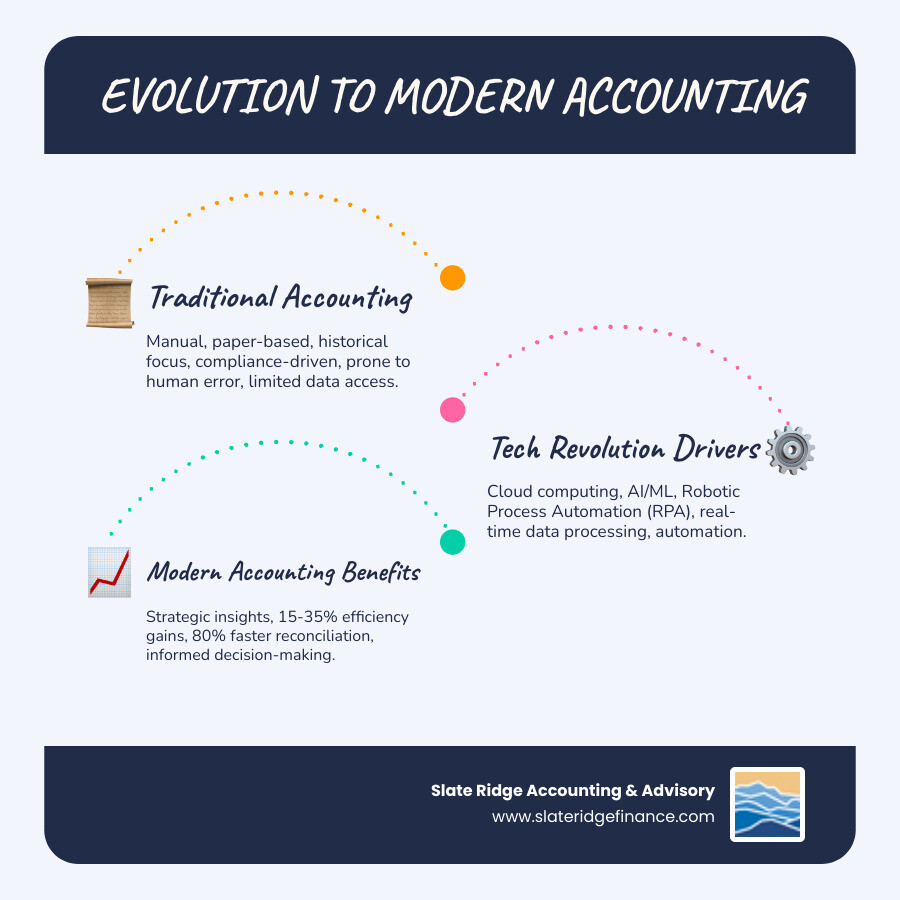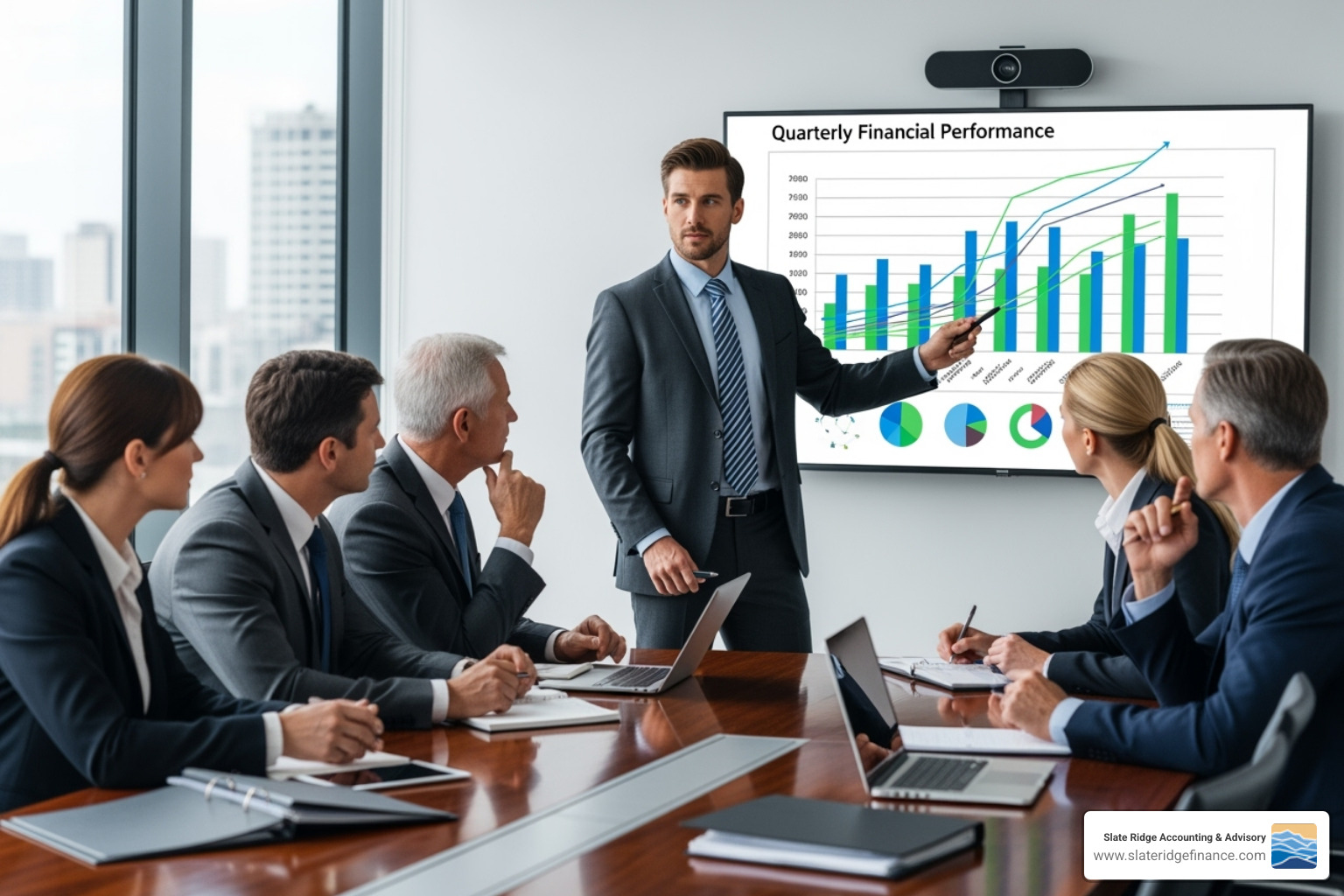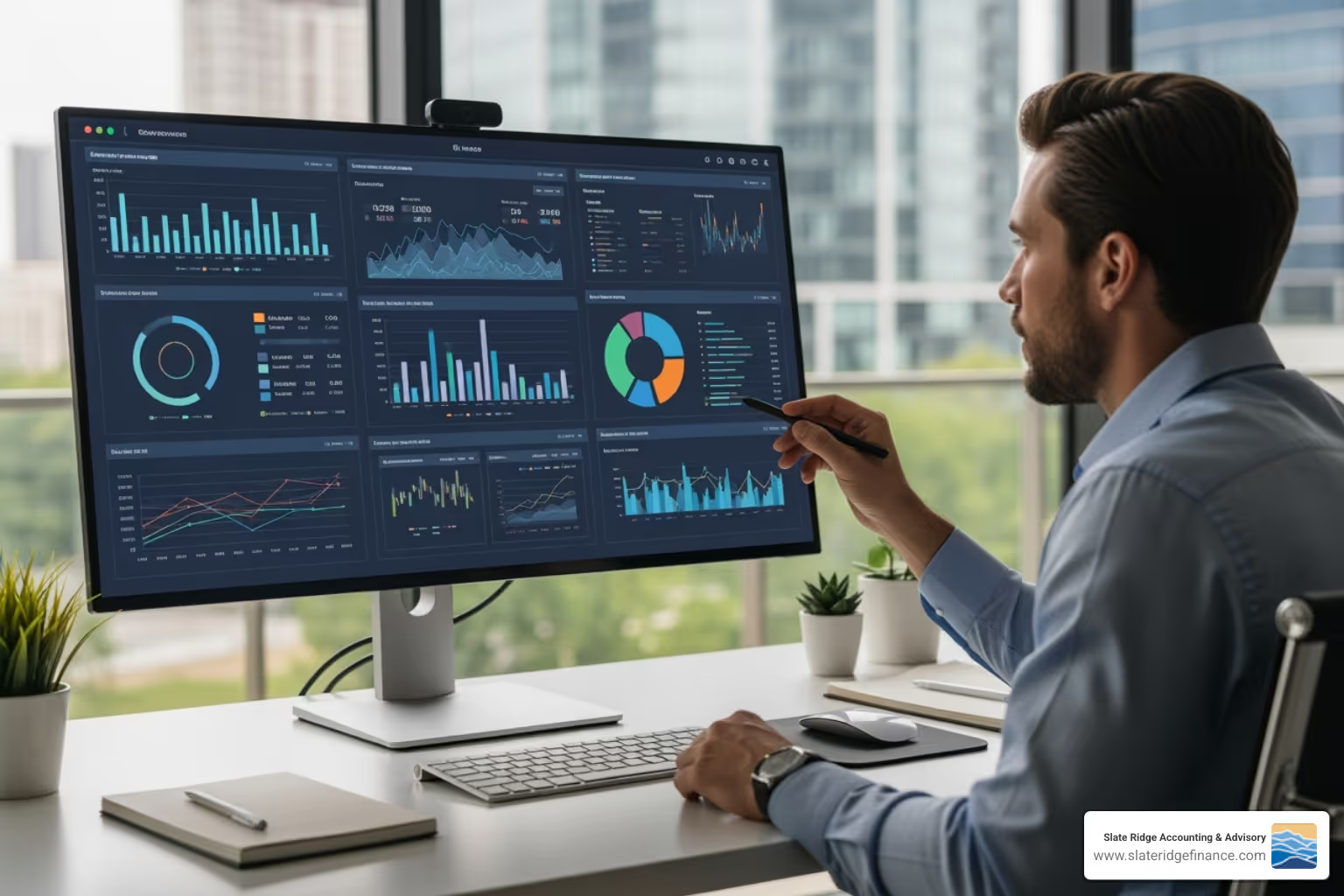Why Modern Accounting Practices Are Essential for Business Success
Modern accounting practices represent a fundamental shift from traditional, paper-based bookkeeping to technology-driven financial management that provides real-time insights and strategic value. Here's what defines modern accounting:
Key Components:
- Cloud-based systems for anywhere, anytime access
- Automated data entry and transaction processing
- Real-time financial reporting and dashboards
- AI-powered analytics for predictive insights
- Integrated business systems (CRM, inventory, payroll)
- Strategic advisory focus beyond basic compliance
Main Benefits:
- 15-35% greater efficiency over traditional methods
- 80% reduction in reconciliation time through automation
- Real-time visibility into cash flow and performance
- Improved accuracy through reduced human error
- Strategic insights for informed decision-making
The stakes couldn't be higher. Poor data quality is costing the US economy more than $3 trillion per year, making accurate, modern accounting not just a convenience—it's a competitive necessity.
As one industry expert noted, "Legacy accounting teams are losing daily—in dollars, time, and control." The businesses thriving today aren't just keeping better books—they're using modern accounting as a strategic weapon to make smarter decisions, spot opportunities faster, and scale more efficiently.
For small and medium business owners drowning in spreadsheets and manual processes, modern accounting offers a lifeline. It transforms overwhelming financial complexity into clear, actionable insights that drive growth.

Modern accounting practices terms to know:
From Ledgers to the Cloud: The Shift from Traditional to Modern Accounting
Accounting's history traces back over 5,000 years to Mesopotamian clay tablets. The practice evolved significantly in 1494 when Luca Pacioli introduced double-entry bookkeeping—a system foundational for centuries. Recently, however, accounting has undergone a massive digital revolution, changing the very nature of financial record-keeping.
The biggest difference between traditional and modern accounting practices is a fundamental shift from a backward-looking, compliance-focused chore to a forward-looking, strategic powerhouse.
Let's take a closer look at this incredible change:
| Metric | Traditional Accounting | Modern Accounting |
|---|---|---|
| Speed | Slow, manual processes, often monthly or quarterly | Real-time data processing, continuous updates |
| Accuracy | Prone to human error, manual data entry | High accuracy, automated validation, reduced human error |
| Data Access | Limited, physical records, on-site only | Accessible anywhere, anytime via the cloud |
| Focus | Historical data, compliance, tax reporting, record-keeping | Strategic insights, forecasting, decision support, value creation |
| Tools | Paper ledgers, spreadsheets, desktop software | Cloud-based software, AI, ML, RPA, integrated platforms |
What Was Traditional Accounting?
For centuries, traditional accounting was a manual, paper-based process. Financial transactions were recorded by hand in physical ledgers, with a focus on documenting past activity for compliance and tax purposes.
While the core ideas were solid, the work was time-consuming and prone to human error. Data accessibility was limited to physical records in an office, making real-time insights impossible. The accountant's role was to prepare accurate historical statements, which offered little strategic help for businesses needing to adapt quickly.
What is Modern Accounting?
Modern accounting practices use technology to turn manual tasks into efficient processes. As experts explain, this involves "the application of technology and software that automates processes and dramatically reduces the need for human execution of repetitive tasks."
This means moving from manual entry to digital capture, from monthly reports to real-time insights, and from compliance to proactive advice. Cloud-based systems are central, allowing access to financial information from anywhere. This improves efficiency and accuracy by reducing human error and frees up accountants to focus on analysis and helping you make smarter business decisions. To learn more about this foundational shift, you can find More info about cloud accounting services on our blog.
The Tech Revolution: Key Technologies Driving Modern Accounting Practices
Technology is the engine powering today's accounting change. A suite of powerful technologies is reshaping how we handle financial data, making modern accounting practices faster, smarter, and more strategic.

These technologies work together: Automation eliminates tedious manual work, boosting efficiency and accuracy by removing human error from routine data processing tasks.
Cloud Computing: The Foundation of Accessibility
Instead of being tied to a filing cabinet, your financial records can live securely in the digital cloud, accessible anywhere. This is the magic of cloud computing—the bedrock of modern accounting practices.
Cloud computing creates a centralized data hub for secure access. With 27% of the full-time workforce now remote, this is essential for seamless collaboration. The scalability is also ideal for growing businesses, as cloud systems grow with you automatically, adapting to your needs without requiring expensive server upgrades.
Improved security is another key benefit. Cloud providers use military-grade encryption and conduct regular security audits that most small businesses can't afford. Plus, disaster resilience means your financial data survives even if your office floods or burns down. Most importantly, the cloud enables real-time collaboration, making month-end closes faster and more accurate.
Artificial Intelligence (AI) and Machine Learning (ML)
AI and Machine Learning are no longer science fiction; they are actively working in modern accounting practices to make accountants' lives easier.
Automated data entry is a primary game-changer, as AI can read receipts and invoices and enter the data automatically. Beyond that, anomaly detection capabilities spot unusual patterns that might indicate errors or a need for fraud prevention. Predictive analytics takes this further, helping forecast future trends and cash flow needs, changing accounting into a forward-thinking strategic tool.
Businesses using AI in their accounting see 40% improved close productivity by automating key workflows. Our virtual accounting services leverage these AI solutions to give our clients a competitive advantage.
Robotic Process Automation (RPA)
RPA acts as a digital workforce, using software robots to handle repetitive, rule-based tasks. While AI is for learning, RPA excels at automating repetitive tasks with perfect consistency.
Invoice processing and data reconciliation become automated, with the system extracting information, matching it to purchase orders, and cross-referencing data across platforms. Automated journal entries are another major win, with RPA achieving up to 95% journal posting automation. This technology frees accountants from mundane tasks to focus on analysis and strategy.
Data Analytics and Business Intelligence (BI)
Data analytics and BI tools assemble raw financial data into a complete picture, telling the story of your business. They transform numbers into actionable insights.
KPI tracking becomes visual with dashboards showing your business health at a glance. You can spot trends, identify opportunities, and catch problems early. Identifying operational inefficiencies becomes easier when you can see data patterns, empowering better risk management and informed strategic decision-making.
Analytics can reveal a 30% reduction in days to reconcile by identifying bottlenecks. This shift from reactive reporting to proactive analysis is the heart of modern accounting practices—turning your financial function into a strategic advantage.
The Strategic Advantage: Benefits and Evolved Roles in Modern Finance
The adoption of modern accounting practices isn't just about technological upgrades; it's about fundamentally reshaping how businesses operate and how financial professionals contribute to their success. The benefits extend far beyond mere efficiency, creating a strategic advantage that can differentiate thriving businesses from those struggling to keep up.

Tangible Business Benefits
When businesses accept modern accounting practices, the results speak for themselves. The change touches every aspect of financial operations, creating measurable improvements that directly impact the bottom line.
Efficiency gains are dramatic. Automation of repetitive tasks doesn't just reduce manual effort—it eliminates the human errors that plague traditional bookkeeping. Tasks that once took hours now happen in minutes. HighRadius Transaction Matching, for example, achieves 80% reconciliation automation, turning what used to be a month-end nightmare into a smooth, automated process.
Cost savings compound over time. According to McKinsey & Company, businesses that spend more time on high-value accounting activities see 15-35% greater efficiency over a ten-year period compared to traditional methods. That's not just about doing things faster—it's about freeing up resources to focus on what really drives growth.
Data security actually improves when you move to the cloud. While some business owners worry about security, reputable cloud-based systems offer advanced encryption, multi-factor authentication, and regular backups that far exceed what most small businesses can achieve on their own.
Cash flow visibility transforms decision-making. Real-time financial data means you can spot trends before they become problems and capitalize on opportunities while they're still fresh. This kind of agility helps businesses Grow Your Small Business with Smart Financial Strategies by making every financial decision more informed and timely.
The Accountant's New Role: From Number-Cruncher to Strategic Advisor
Perhaps the most exciting change brought about by modern accounting practices is how it's changing the role of financial professionals. The days of accountants being confined to back-office number-crunching are rapidly disappearing.
Technology handles the mundane tasks, which frees up accountants to do what humans do best—think strategically, interpret data, and provide valuable insights. Instead of spending hours on data entry and reconciliation, today's accounting professionals can focus on analyzing trends, forecasting future performance, and identifying opportunities for growth.
Business partnering becomes the new normal. Accountants are now sitting at the strategy table, offering insights that help build more resilient organizations and drive faster growth. They're translating complex financial data into clear, actionable recommendations that non-financial business leaders can understand and act upon.
This evolution requires new skills—critical thinking, data interpretation, and especially effective communication. The most valuable accountants today are those who can take sophisticated financial analysis and explain it in plain English, helping business owners make confident decisions about their future. The evolving role of accountants in strategic planning explores this change in greater detail, showing how financial professionals are becoming indispensable strategic advisors rather than just compliance specialists.
Navigating the Transition: Implementation and Future Trends
Making the shift to modern accounting practices can feel overwhelming, but it doesn't have to be. Think of it as upgrading your business's financial engine—yes, there's an investment involved, but the performance gains are worth every penny. The key is approaching this change thoughtfully and strategically.
Core Features of Modern Accounting Systems
When you're ready to accept modern accounting practices, you'll want to look for systems that truly deliver on the promise of modern finance. The foundation starts with cloud infrastructure—this isn't just a nice-to-have anymore, it's essential. Your financial data needs to be accessible whether you're in the office, at home, or grabbing coffee at your favorite café.
Automated bookkeeping is where the magic really happens. Instead of spending hours manually entering transactions and reconciling accounts, modern systems handle this automatically. Your invoices, receipts, and bank transactions flow seamlessly into the right categories, leaving you free to focus on what the numbers actually mean for your business.
Real-time reporting dashboards transform how you understand your business. Rather than waiting until month-end to see how things are going, you get an instant snapshot of your financial health whenever you need it. These dashboards can be customized to show exactly what matters most to you—cash flow, profit margins, or key performance indicators.
The real power comes from seamless integrations through APIs. Your accounting system should talk to your CRM, payroll software, and inventory management tools without any manual intervention. This creates a unified view of your business where data flows naturally between systems.
Finally, proactive anomaly identification acts like a financial early warning system. AI-powered tools flag unusual transactions or discrepancies before they become bigger problems, giving you peace of mind and protecting your business.
A Roadmap for Implementing Modern Accounting Practices
Transitioning to modern accounting practices works best when you follow a clear roadmap. Start by taking an honest look at your current processes—where are you spending too much time? What tasks feel repetitive or error-prone? These pain points will guide your modernization efforts.
Next, define your goals clearly. Maybe you want faster month-end closes, better cash flow visibility, or more strategic insights. Having specific objectives helps you choose the right technology and measure success along the way.
Choosing the right technology is crucial, but don't get overwhelmed by all the options. Focus on cloud-based solutions that can grow with your business and integrate well with tools you already use. Scalability matters more than you might think—what works for your business today should still work as you double or triple in size.
Data migration requires careful planning. You'll want to clean up your historical data and ensure it transfers accurately to your new system. This step often reveals data quality issues you didn't know existed, so budget extra time for this phase.
Finally, prioritize team training because even the best technology is only as good as the people using it. Your team needs to feel confident with the new tools and understand how their roles are evolving. If you need support during this transition, our bookkeeping services for small businesses can provide valuable assistance.
Overcoming Common Challenges
Every business faces problems when implementing modern accounting practices, but knowing what to expect makes them much more manageable. Resistance to change is natural—people get comfortable with familiar routines, even inefficient ones. The solution is involving your team in the process and clearly communicating how the changes will make their work easier and more meaningful. Effective change management strategies can help steer this transition smoothly.
Implementation costs often cause sticker shock, but think of this as an investment in your business's future. The efficiency gains, error reduction, and strategic insights you'll gain typically pay for the initial investment within the first year. Plus, cloud-based solutions eliminate many of the ongoing maintenance costs of traditional systems.
Data security concerns are valid, especially when moving sensitive financial information to the cloud. However, reputable cloud providers invest millions in security measures that far exceed what most businesses can achieve on their own. They use advanced encryption, multi-factor authentication, and regular security audits to protect your data.
The skills gap is perhaps the most significant long-term challenge. Modern accounting requires new competencies in data analysis, technology, and strategic advisory work. This means ongoing training and professional development for your accounting team—but it also means more interesting, valuable work for them.
The Future of Accounting
The evolution of modern accounting practices isn't slowing down—if anything, it's accelerating. Continuous accounting represents the holy grail of financial management, where your books are always current and financial statements can be generated instantly. This "virtual close" capability is becoming reality for forward-thinking businesses.
Blockchain technology is moving beyond cryptocurrency to create tamper-proof audit trails for financial transactions. While still emerging, blockchain promises unprecedented transparency and trust in financial reporting.
ESG reporting is changing from nice-to-have to must-have as stakeholders demand greater accountability around environmental, social, and governance factors. Accountants are becoming the stewards of this non-financial data, integrating sustainability metrics into corporate reporting.
Hyper-automation combines AI, machine learning, and robotic process automation to create end-to-end automated processes. We're talking about systems that can handle entire workflows without human intervention while still maintaining the oversight and strategic input that only humans can provide.
The future also holds predictive and prescriptive analytics that go beyond telling you what happened to predicting what will happen and suggesting optimal actions. Imagine your accounting system not just reporting low cash flow but recommending specific strategies to improve it.
To stay current with these evolving trends, keep an eye on the future of the accounting profession and be ready to adapt. The businesses that accept these changes early will have a significant competitive advantage over those that wait.
Frequently Asked Questions about Modern Accounting
Let's address the questions we hear most often from business owners considering the switch to modern accounting practices. These concerns are completely natural – after all, you're thinking about changing how you handle one of the most critical aspects of your business.
How does modern accounting improve accuracy?
The difference in accuracy between traditional and modern accounting practices is honestly pretty remarkable. Think about it this way: every time someone manually enters a number, there's a chance for error. Maybe they're tired, distracted, or just having an off day. We're all human, after all.
Modern accounting practices tackle this head-on through automation that eliminates most manual data entry. Instead of someone typing in every transaction, the system captures data directly from bank feeds, receipts, and invoices. AI algorithms work behind the scenes, validating information in real-time and cross-referencing details from multiple sources.
Here's what makes the biggest difference: continuous reconciliation. Rather than waiting until month-end to catch problems, modern systems flag discrepancies the moment they happen. It's like having a vigilant assistant who never sleeps, constantly checking that everything adds up correctly. This prevents small errors from snowballing into big headaches down the road.
Is modern accounting secure?
This is probably the question we get asked most, and honestly, it makes perfect sense. You're thinking about moving your most sensitive financial data to "the cloud" – of course you want to know it's safe.
Here's the reality: reputable cloud providers actually offer better security than most small businesses can achieve on their own. These companies invest millions in security infrastructure because their entire business depends on keeping your data safe. We're talking about advanced encryption that scrambles your data, multi-factor authentication that adds extra layers of protection, and regular security audits by independent experts.
Compare that to keeping files on your office computer or in a filing cabinet. What happens if there's a fire, flood, or break-in? With modern cloud systems, your data is backed up across multiple secure locations with disaster recovery protocols that ensure you never lose critical information.
While no system is 100% bulletproof, the security measures in modern accounting practices are designed by teams of cybersecurity experts who make it their full-time job to stay ahead of threats.
Can small businesses benefit from modern accounting practices?
This might be our favorite question because the answer is such an emphatic yes! Modern accounting practices aren't just for big corporations with huge IT budgets. In many ways, small businesses actually benefit more than anyone else.
Think about it: as a small business owner, you're probably wearing multiple hats already. You're the CEO, the sales team, maybe even the janitor some days. The last thing you need is to spend hours each week wrestling with spreadsheets and manual bookkeeping.
Scalable, affordable software means you can access the same powerful tools that big companies use, without the massive upfront costs. Automation frees up your precious time so you can focus on what you do best – running and growing your business. Real-time financial data gives you the insights you need to make smart decisions quickly, whether that's knowing if you can afford that new hire or understanding which products are actually profitable.
Perhaps most importantly, modern accounting practices give small businesses access to strategic financial guidance that used to be reserved for much larger companies. At Slate Ridge Accounting & Advisory, we help small businesses track their KPIs and forecast growth using these same modern tools and approaches, giving them a real competitive advantage in their markets.
Conclusion

The journey from clay tablets to cloud computing might seem like ancient history, but for many businesses, the transition to modern accounting practices is happening right now. And frankly, it's about time.
We've seen how traditional accounting kept businesses looking backward, buried in paper trails and manual processes that ate up precious time and energy. Meanwhile, modern accounting practices flip the script entirely. They transform your financial function from a necessary evil into a strategic powerhouse that actually helps you grow.
The numbers don't lie. When businesses accept cloud-based systems, AI-powered insights, and real-time reporting, they're not just saving time—they're gaining a competitive edge. They're making smarter decisions faster, catching problems before they become disasters, and freeing up their teams to focus on what really matters: building their business.
But here's what we've learned after working with countless small businesses: the technology is only as good as the people who implement it. That's where the human touch becomes invaluable. The shift from historical reporting to forward-looking strategy doesn't happen automatically—it requires expertise, patience, and a partner who understands your unique challenges.
At Slate Ridge Accounting & Advisory, we've built our entire practice around this philosophy. We don't just implement modern systems; we help you understand what your numbers are telling you. We turn your KPIs into actionable insights and help you forecast growth with confidence. Because at the end of the day, your accounting should work for you, not the other way around.
The businesses thriving today aren't necessarily the biggest or the oldest—they're the ones that acceptd change and turned their financial operations into strategic advantages. The question isn't whether you can afford to modernize your accounting practices. The question is whether you can afford not to.
Ready to see what modern accounting practices can do for your business? Explore our pricing to see how we can modernize your finances and turn your numbers into your next competitive advantage.
Ready to get started?
Book a free consultation today and let’s explore how Slate Ridge can support your business with expert accounting that’s accurate, timely, and built around your goals.



